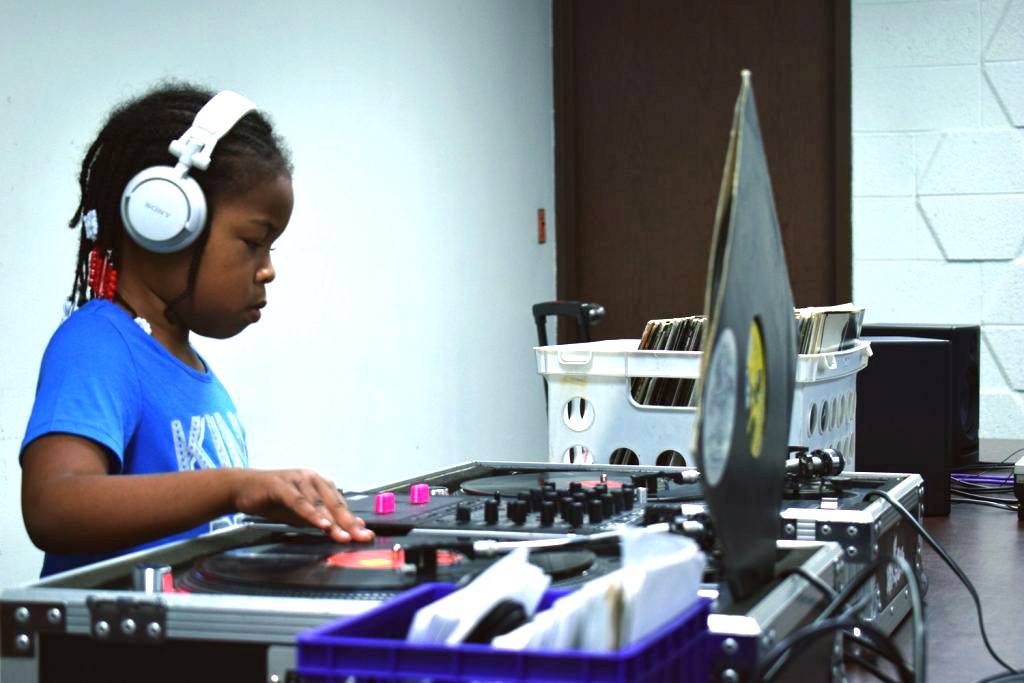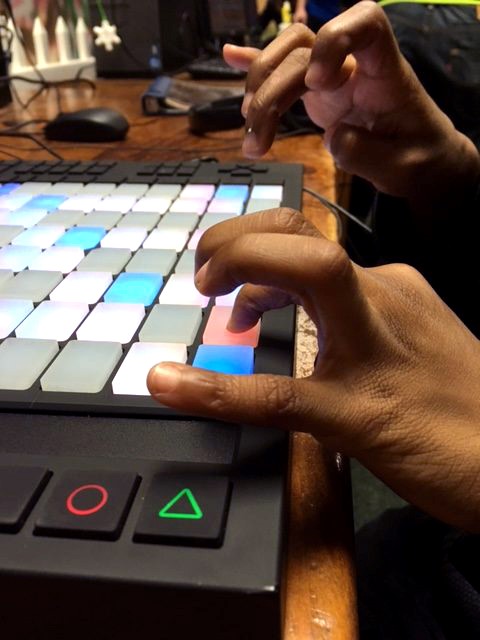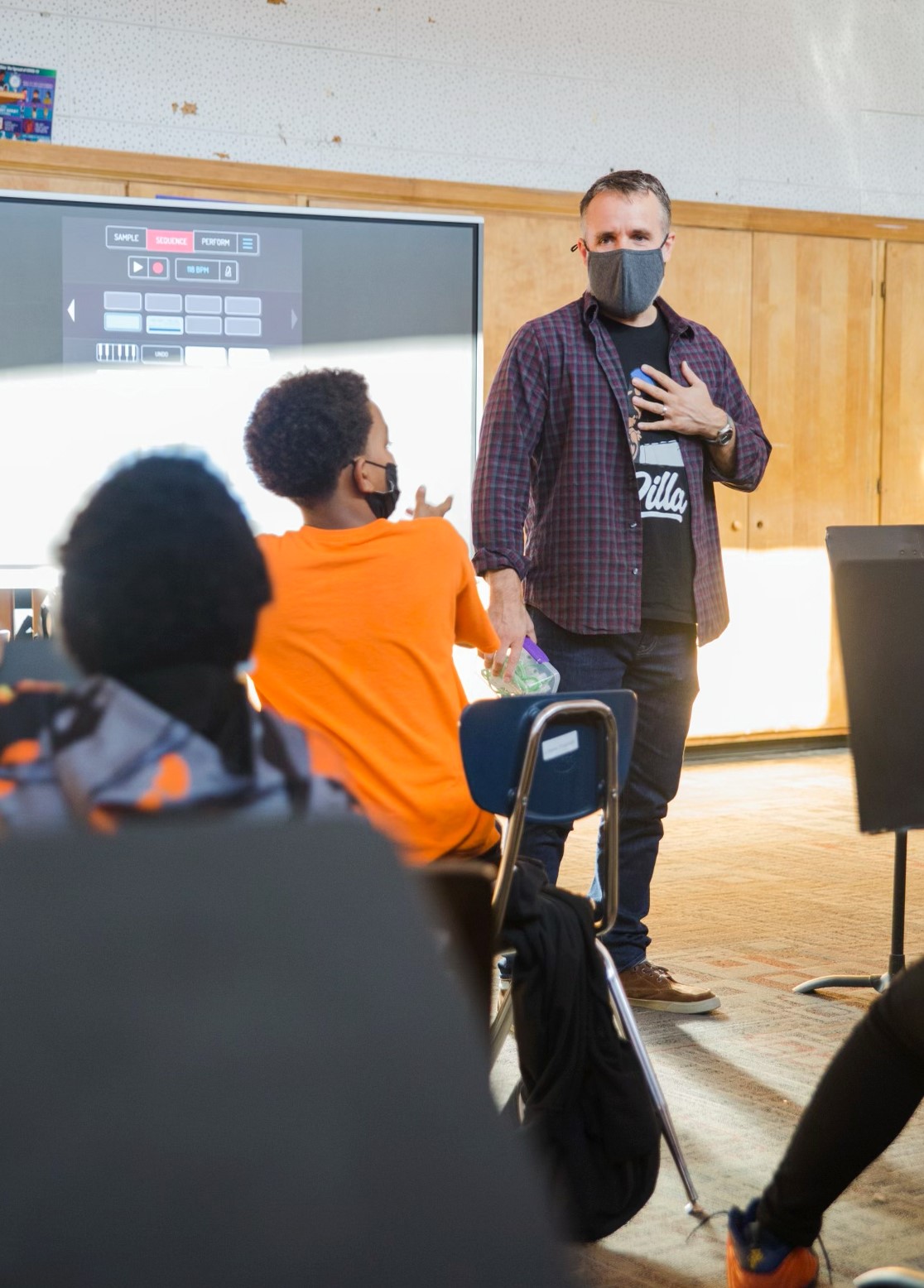Making Spaces for Making Sounds
- Emery Petchauer, Ed.D.
- Associate Professor, Department of English
- Coordinator, English Education Program
- College of Arts and Letters
- Associate Professor, Department of Teacher Education
- College of Education
Project Overview
- Research-supported creative sound-making programming in partnership with community organizations in Pontiac, Michigan, offers youth, community members, and emerging artist-educators collaborative spaces for self-expression, networking, and personal and professional growth.
Products/Outcomes
- Asset-based programming for youth and the general public
- Expanded teaching networks among artists
- Increased teaching capacity of artists
Partners
- Tia Harvey, Accent Pontiac
- Rolando Ybarra, Accent Pontiac
- Remus Webb, Accent Pontiac (Past partner)
- Matt 'MVG' VanGilder, Motor City Street Dance Academy (MCSDA)
- Baldwin Center, Pontiac, Michigan (Past partner)
- Pontiac Public Library, Pontiac, Michigan
- 20+ Detroit metro area musicians and sound artists
Form(s) of Engagement
- Community-Engaged Creative Activity
- Community-Engaged Teaching and Learning
- Community-Engaged Research

A young, emerging sound artist learns DJing and turntablism at a community event at the Pontiac Public Library.
A long-time DJ, turntablist, beat-maker, and crate digger, Emery Petchauer loves to bring people into community through creative spaces. Referencing the philosophy of American author and social activist, Grace Lee Boggs, he says it's the critical connections among people, not the critical mass of people, that matters.
"It's really these creative practices that bring about most friendships in most of the places where I spend time when I'm not on the job, and sometimes on the job, as well," said Petchauer. "So making space for people to connect with one another through these kinds of activities is hardwired into how I operate—it grows from this kind of person that I am and how I try to move."
A faculty member in both the Department of English and Department of Teacher Education, Petchauer's teaching, research, and community engagement focus on creative public pedagogy, educational justice, literacy, and aural humanities, particularly as enacted in public, urban spaces.
One of his current projects, Sound Making Publics, is a collection of creative sound-making and space-making activities in Pontiac, Michigan, that provide asset-based programming for youth and the general public with a tri-fold focus on literacy formation in youth, development of local artists' teaching capacity, and building youths' expression of justice through creative sound-making.
Creative Collaborations
These activities include a variety of beatmaking and songwriting workshops, classes, and camps offered in collaboration with several Pontiac organizations, including Accent Pontiac, the Pontiac Library, and the Baldwin Center, as well as at local schools. It was in his capacity as an active and visible artist who supports other DJs, music producers, and record enthusiasts that Petchauer was naturally able to build creative collaborations.
"There's a certain kind of solidarity that builds between artists, and that solidarity makes collaborations come pretty naturally," he said. "With respect to Pontiac, that's where I've lived for the last nine years, and I feel an ethical obligation to connect my professional work and resources to where I live. I'm also always thinking about what can happen if we make connections between existing networks of people and resources. So I'm always inviting people into what I'm doing and cultivating the network and doing my part to curate the network so that we can all share the duties of teaching and learning and educating through these settings."
From 2015-2018, Petchauer facilitated a once-a-week after school program at the Baldwin Center, collaborating with local music producers to work with the kids on DJing, beatmaking, and songwriting. This effort evolved into a summer camp, where he and his partners offered kids the opportunity to learn about beatmaking and songwriting with local artists.
Over the last four years, he has been facilitating a community beatmaking, DJing, and turntablism summer workshop series at the Pontiac Public Library for the general public. This series brings a network of music producers, hip-hop/electronic music artists, and sound-making artists into an intergenerational "sandbox"-type space where people visit a variety of stations to work with producers or try out sound equipment, such as turntables, mixers, or MIDI sequencers. This collaboration with the Pontiac Library is resulting in one of Petchauer's key ethical outcomes, building the teaching capacity of local artist-educators by giving them the opportunity to teach in low-stakes settings.

A student learns to make beats at a beatmaking and DJing workshop at the Baldwin Center in Pontiac, Michigan.
"A lot of the DJs and music producers that help out at the open library sessions at the Pontiac Library wouldn't call themselves educators or teachers, but they're getting practice teaching when they work with youth at sessions," said Petchauer. "And for the ones I've been working with for many years, I can see their growth as educators over time."
One local artist-educator, Matt Van Gilder, demonstrates this kind of capacity building. Van Gilder is a music producer who has worked with Petchauer at all three Pontiac locations and is now designing and teaching his own beatmaking production programming at the Motor City Street Dance Academy on Michigan Avenue in Detroit. For Van Gilder, his teaching is about much more than just beatmaking.
"What I see in the kids who we've reached out to through these programs, is watching them come into their own, in the sense that they have an outlet to express themselves, which can otherwise be a very undiscovered thing," said Van Gilder. "They come in with these notions like, 'Oh, I don't want to do that. I don't want to make too much noise. I don't know how to express myself.' So sometimes, we don't even really make music; sometimes, we'll just talk about their mental state and what they think is their reality. And that's also beneficial for me, because it creates a safe space and gives access to new forms of ideas and thinking and processing what they perceive to be their reality."
Van Gilder acknowledges that collaborating with Petchauer over the years has given him confidence in his own teaching style.
"What I've learned through those spaces Emery provided for me is that I like to teach through mindfulness," he said. "I know what I'm talking about when I'm in those spaces, and it gives me a chance to fortify that. When I'm really in the moment, I see people interact with a thought. That's really indescribable, because it's someone else's experience, and I'm just lucky to be involved and facilitate that."
Participatory Research and Collaborative Sense-Making
Petchauer also collaborates with Accent Pontiac, a social change-through-music non-profit organization that offers youth programming in various Pontiac locations, including Pontiac Middle School, where Petchauer co-teaches a music production beatmaking class and song/lyric-writing class after school twice a week. The songwriting class gently encourages literacy through creativity.

Emery Petchauer leads young artists in a sound-making and songwriting session at Accent Pontiac.
"In the academic field of literacy, we think not just about reading and writing, but also about listening, sound, aurality—how they matter when it comes to learning, expressing, and composing," said Petchauer. "So, literacy learning is multi-modal in that way. But I don't let that literacy thread keep other aspects of the activities from unfolding in other directions. I like the activities in the community settings to lead the way, and I'm actually really curious about how all of that expands literacy in different directions and how that evolves over time."
The teaching and learning that happens in this class, as well as at other Accent Pontiac classes, has become the basis for a research project co-designed and implemented with his collaborators.
"Participatory co-design means that the participants of research are also part of designing the research and deciding what the focus is on," explained Petchauer. "So, working with Accent Pontiac, I facilitated a process at the start of each year where the collaborators—teaching artists and staff members—developed some of the questions that drive the research on the teaching and learning in the program. Then, instead of just me analyzing data from the projects—data might be transcriptions of some of our discussion sessions with youth or lyric-writing artifacts—we meet for a sense-making session every two weeks, and we do the analysis, and we make sense together. So we might look at how students annotated the lyrics from one of the songs in the "Music +" ethnomusicology class at Accent Pontiac, or we listen to conversations from our song-writing class where students are talking and writing about what freedom means to them. Ultimately, we'll bring youth into that sense-making process, as well. So, it's a collaborative analysis that speaks into the research and also gives teaching artists an opportunity to think deeply about their practice."
Community Creative Assets, Growth, and Change Promote Sustainability
According to Petchauer, these collaborations have evolved and changed over the years, one collaboration leading to another, ensuring a pattern of sustainability and expanding and strengthening a network of local artist-educators in Southeast Michigan.
"I find that everything really evolves out of something else, and you don't really quite see that evolution until you look back across a few years to realize a certain plant that's now growing was actually seeded long ago," said Petchauer. "And that's definitely the case for the Sound Making Publics activities. Those grew out of activities that weren't even initially a part of research."
A resident of Pontiac, himself, he strongly believes in utilizing and building on the assets of his own community.
"In organizing this kind of work, I always start with the assumption that you can do a lot with what's already around you, whether that's the people around you, the resources around you, the equipment around you. It's really a matter of bring the resources that are around you into relationship with one another in a certain kind of way to build power. For this specific project, it's really just about starting with the strengths and the artistic assets that are already around us in our community and bringing those together to then build the strength of that community in creating opportunities for people young and old to connect through sound."
- Written by Amy Byle, University Outreach and Engagement
- Photographs courtesy of James Easterly, Emery Petchauer, and Rolando Ybarra